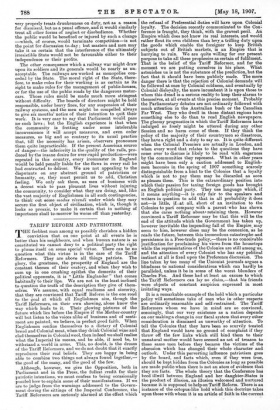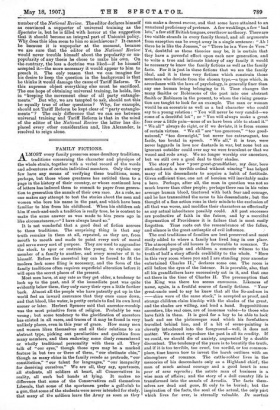TARIFF REFORM AND PATRIOTISM. rilHE feeblest man among us possibly
cherishes a hidden 1 conviction that on one point at all events he is better than his neighbours, and when human nature is so constituted we cannot deny to a political party the right to plume itself on some special virtue. There can be no question what this virtue is in the case of the Tariff Reformers. They are above all things patriots. The glory, the greatness, the prosperity of England are the constant themes of their oratory, and when they wish to sum up in one crushing epithet the demerits of their political opponents, it is "Little Englander" that comes habitually to their lips. We are not in the least inclined to question the truth of the description they give of themselves. We assume, with equal readiness and sincerity, that they are convinced that Tariff Reform is the one road to the goal at which all Englishmen aim, though the Tariff Reformers, on their own showing, alone know the way which leads to it. Their glowing pictures of the future which lies before the Empire if the Mother-country will but listen to the voices alike of business and of sentiment are painted, we believe, in perfect good faith. When Englishmen confine themselves to a dietary of Colonial bread and Colonial meat, when they drink Colonial wipe and clad themselves in Colonial wool, then indeed we shall realise what the Imperial tie means, and be able, if need be, to withstand a world in arms. This, no doubt, is the dream of the Tariff Reformers, and we do not doubt that it exactly reproduces their real beliefs. They are happy in being able to combine two things not always found together,— the good of the many, and the good of the few.
Although, however, we give the Opposition, both in Parliament and in the Press, the fullest credit for their patriotic intentions, we must confess to being occasionally puzzled how to explain some of their manifestations. If we are to judge from the warnings addressed to the Government during the sittings of the Imperial Conference, the Tariff Reformers are seriously alarmed at the effect which
the refusal of Preferential duties will have upon Colonial loyalty. The decision recently communicated to the Conference is fraught, they think, with the gravest peril. An Empire which does not know its real interests, and Would rather flout its own children than levy, a trifling duty upon the goods which enable the foreigner to keep British subjects out of British markets, is an Empire that is hurrying to ruin. We are quite willing for our present purpose to take all these prophecies as certain of fulfilment. That is the belief of the Tariff Reformer, and for the moment we are putting ourselves in his place. What astonishes us is not the substance of the prediction, but the fact that it should have been publicly made. The more danger there is that the rejection of Colonial demands will be followed at once by Colonial coldness, and eventually by Colonial disloyalty, the more incumbent it is upon those to whom this dread is a serious reality to keep their alarms to themselves, at all events at this precise moment.' Probably the Parliamentary debates are not ordinarily followed with much attention in the Australian bush or the Canadian Far West. They who dwell in those distant regions have something else to do than to read English newspapers. The gloomy prognostics in which the Tariff Reformers have indulged so freely might be uttered during any other Session and no harm come of them. If they think the policy of the majority of their countrymen so disastrous, they have a right and a duty to say so. It is quite different when the Colonial Premiers are actually in London, and when every word that relates to the questions they have come over to discuss is likely to be read with eagerness by the communities they represent. What in other years might have been only a caution addressed to Englishmen becomes in the spring of 1907 something scarcely distinguishable from a hint to the Colonies that a loyalty which is not to pay them may be discarded as soon as pleases them. This is the extraordinary position into which their passion for taxing foreign goods has brought an English political party. They use language which, if it means anything—it is only fair to the speakers and writers in question to add that in all probability it does not—is little, itaxt all, short of an invitation to the Colonies to part company with a parent who has shown that she cares nothing about % retaining them. However convinced a Tariff Reformer may be that this will be the end of the attitude which the Government has taken up, however inevitable the impending fall of the Empire. may seem to him, however close may be the connexion, as he reads the future, between this tremendous catastrophe and persistence in a Free-trade policy,—there is no conceivable justification for proclaiming his views from the housetops while the representatives of the Colonies are still among us, and the attention of every Colonist who has any political instinct at all is fixed upon the Preference discussion. The line taken by too many of the Unionist journals argues a blindness to national considerations which can hardly be paralleled, unless it be in some of the worst blunders of Charles Fox. And these had at least an excuse to which the Tariff Reformers can lay no claim,—that his friends were objects of constant suspicion expressed in most irritating ways.
It is a remarkable example of the hold which a particular policy will sometimes take of men who in, other respects are ordinarily reasonable and self-restrained. The Tariff Reformers whom we have in mind are so convinced, seemingly, that our very existence as a nation depends on our making a change in our fiscal system that every other consideration is dismissed as unworthy of attention. To tell the Colonies that they have been so scurvily treated that England would have no ground of complaint if they threw off the few links which still bind them to their unnatural mother would have seemed an act of treason to these same men before they became the victims of the obsession which has changed their whole character and outlook. Under this perverting influence patriotism goes by the board, and facts which, even if they were true, should be kept hidden from the Colonies as long as possible are made public when there is not an atom of evidence that they are facts. The whole theory that the Conference has bred illwill between England and her daughter-States is the product of illusion, an illusion welcomed and nurtured because it is supposed to help on Tariff Reform. There is an instance of the octopus-like hold which this doctrine takes upon those with whom it is an article of faith in the current number of the National Review. The editor declares himself as convinced a supporter of universal training as the 4'peetater is, but he is filled with horror at the suggestion that it should become an integral part of Unionist policy. Why does this idea seem to him so mischievous It cannot be because it is unpopular at the moment, because we are sure that the editor of the National Review would never trouble himself about the popularity or unpopularity of any thesis he chose to make his own. On the contrary, the less a doctrine was liked—if he himself accepted it—the more necessary it would appear to him to preach it. The only reason that we can imagine for his desire to keep the question in the background is that Ile thinks it would damage the cause of Tariff Reform. To this supreme object everything else must be sacrificed. The one hope of obtaining universal training, he holds, lies in "keeping the movement clear of all party entanglements." But why, we are tempted to ask, should not this beequally true of other questions ? Why, for example, should not Tariff Reform be kept clear of "party entanglements " ? The only difference that we can see between universal training and Tariff Reform is that in the mind of the editor of the National Review the latter has displaced every other consideration and, like Alexander, is resolved to reign alone.







































 Previous page
Previous page